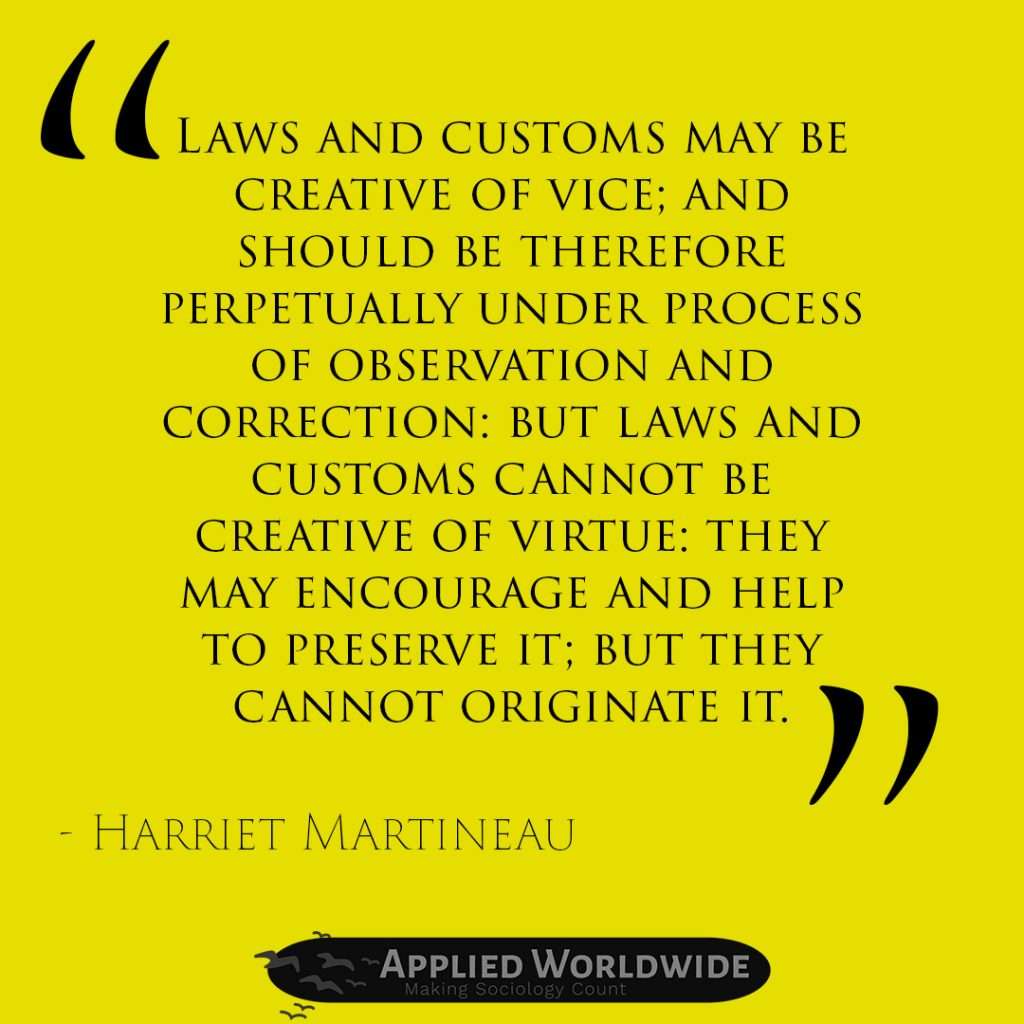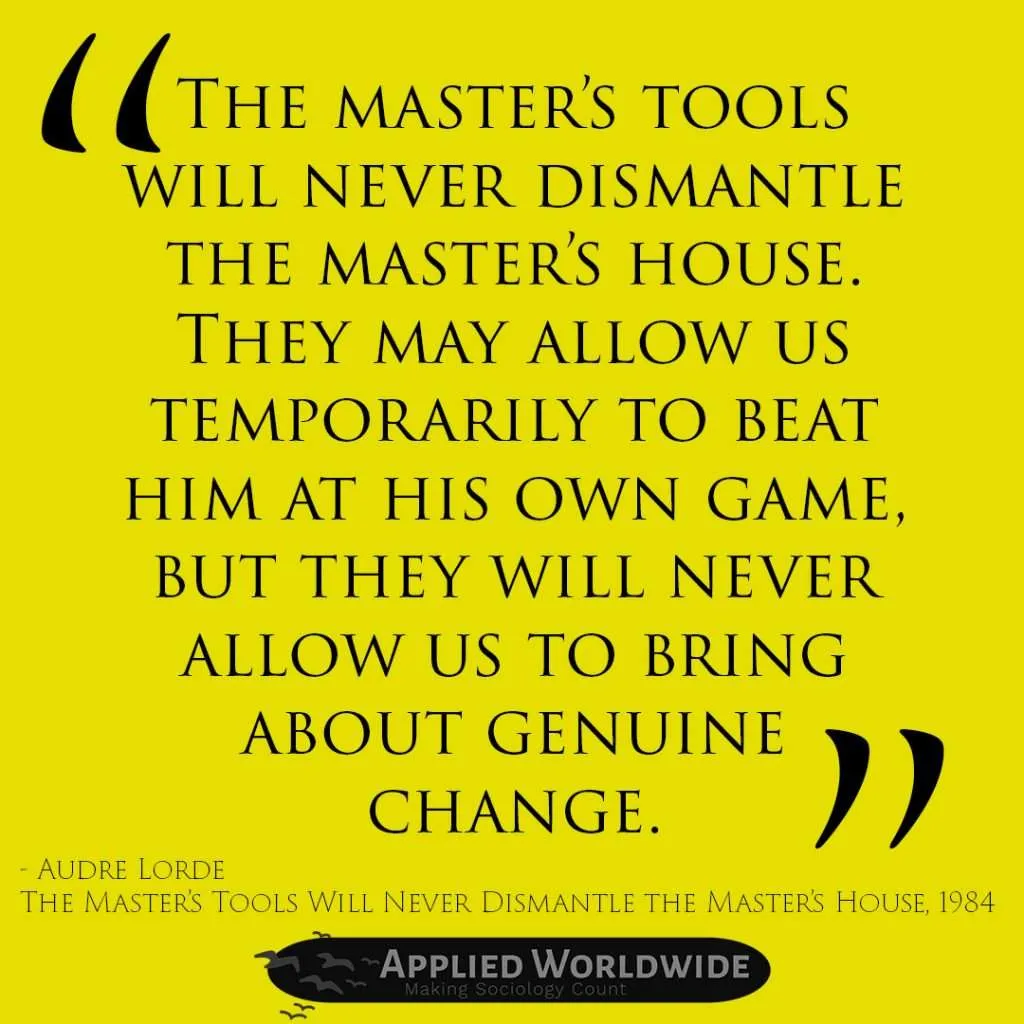In this blog, I discusses the works of Harriet Martineau and Audre Lorde. Harriet Martineau was alive during the late 1800s, and Audre Lorde lived during the 1900s. Both theorists discuss feminism, liberation, and abolition. This blog aims to answer three basic questions:
- Who were they?
- How are they similar?
- Why is it important that we compare these theorists?
Both theorists were self-proclaimed abolitionists. Observing the abolitionist theory of both scholars paints a picture of how the abolitionist movement varies across different historical contexts and highlights the perspectives of two women who grew up in vastly different societies, and were of different races and classes. It is important to survey these similarities in differences to be able to note changes over time in the theories of female sociologists. By doing this, an ideologically sound foundation can be created for current and future theories to be built upon.
A Bit of Background Information
To be able to comprehensively understand the works of both Lorde and Martineau, it is important tounderstand their backgrounds. Due to the radical nature of both theorists for their respective times, their social circumstances and specific vignettes of their life are highly reflective of their subversive nature. Significant happenings in each of their lives also influenced their works. For example, Martineau wrote Life in the Sickroom after her experiences being hospitalized in a mental health facility. Similarly, Lorde wrote The Cancer Journals abouther experience with breast cancer.
Harriet Martineau was a British writer, born in Norwich, England. Her life spanned from 1802 to 1876. She came to prevalence through her translations of the works of philosopher Augustus Comte. In addition to translations, she also wrote anecdotal commentaries on society and used the United States of America as a case study in many of her writings. She also wrote some economic theory as well .
Audre Lorde was an American Poet and Author who lived from 1934 to 1992, nearly a century after Martineau. She held a master’s degree in library science and had a developed career in the academic realm as a teacher at Hunter College and Writer in Residence at the University of Tougaloo in Mississippi. Lorde wrote heavily about her experience as a Black person in America, as well as Lesbian Feminism.
Theorist Profie: Harriet Martineau
Martineau has a lot to say regarding the issue of slavery. She discusses her positions across many essays as well as Society in America and Retrospect of Western Travel, where she documented her findings on a two-year trip around the USA.
Martineau makes the argument against slavery in both economic and ethical respects. Her ethics are rooted largely in Christian morality. Martineau often made the argument that slavery was an inefficient way of producing goods. She posited that slave ownership would lead to a loss of money because of how unpredictable humans are. Simply put: Humans are not machines.
Marineau would rather have people purchase labor instead of owning it as capital. In Intellectual Women and Victorian Patriarchy, she says
“Where the Labour is held as capital, the ca[italist not only pays a much higher price for an equal quantity of labor, but also for waste, negligence, and theft on the part of the laborer. But where the labor is not owned as capital, the capitalist pays for the labor only.”
In this quote, Martineau highlights the fact that when someone owns a slave, they absorb all of the loss that comes with slave ownership. These losses outweigh the material gains that come from the slave labor itself. When someone purchases the labor, they do not need to absorb the losses that come with slave ownership. This, according to Martineau, increases the margin by which one can profit. Thus, slavery (when defined as the blatant pursuit and maintenance of a dominant economic system that is inefficient and money-wasting) is in direct antithesis to the capitalist, Adam-Smith-centric ideals found in her early writings. This becomes prevalent when she says that “An incalculable amount of human suffering is endured for a ‘wholesale waste’ of labour and capital.”

Harriet Martineau’s Plead for a Compromise
Although Martineau looks down upon slavery as an economic system, she also views it as a general ill of society that is antithetical to progress. As someone who lived during the Victorian era, ideas of societal progress undoubtedly influenced her worldview. In volume two of Society in America, she says:
It has thus obviously become the interest of all to whom slavery still is, or believed to be, a gain; of those who hold the richest lands; of those who rear slaves for such lands, of all who dread change; of all who would go quietly through life; and leave it to a future generation to cope with their difficulty—it has become the interest of all such to turn their own attention and that of others from the fact that the time has come when the slave ought to be made into free laborers. They cannot put down that fact into utter silence.
Some sort of compromise must be made with it.
This statement from Martineau highlights how unambiguously pro-abolition she is. Here, she makes references to societal change and directly calls out the dominant privileged class of the south. While Matineau’s economic claims can be seen as purely rational and absent of any sort of activist zeitgeist, this statement solidifies her morally upstanding nature as an abolitionist.
Theorist Profile: Audre Lorde
Audre Lorde lived during the 1900s. Thus, she saw the rise of many counter-cultural movements such as Second Wave Feminism, the Civil Rights Movement, and the Stonewall Protests. This cultural context is important to think about when discussing her work.
Lorde was an abolitionist and a supporter of the movement for Black liberation and was a staunch supporter of Malcolm X. She considered herself to be an “inheritor of his tradition.”
Malcolm X was a civil rights leader and prolific advocate for Black liberation. Lorde believed that while liberation would certainly involve dismantling the external structural systems which oppress Black people, this was not the only approach to Black liberation. In her anthology Sister, Outsider, she says:
As Black people, if there is one thing we can learn from the 60s it is how infinitely complex anymove for liberation must be. For we must move against not only those forces which dehumanize us from the outside, but also against those oppressive values which we have been forced to take intoourselves.
From this quote, it can be seen that Lorde advocates not only for a structural approach to Black liberation but also an interpersonal one. Lorde goes on to say that this interpersonal approach involves community building and camaraderie within the Black community. This quote also involves fostering common visions for what it means to be liberated as a people. Additionally, this sentiment arises from a context where in fighting amongst black scholars and activists was causing a lot of problems and putting a pause on the progression of the movement. This call for unity is done in an attempt to combat this.
Audre Lorde and Intersectionality
In addition to movement practices, Lorde places a strong emphasis on intersectionality. Intersectionality is described as “The study of overlapping or intersecting social identities and related systems of oppression, domination, or discrimination.” For Lorde, the intersecting social identities include being Black, Lesbian, and a woman. In her speech entitled The Master’s Tools Will Never Dismantle the Master’s House, She says:
The absence of any consideration of Lesbian consciousness of the consciousness of Third World Women leaves a serious gap within this conference and within the papers presented here… In this paper, there was no examination of mutuality between women, no systems of shared support, and no interdependence as exists between lesbians and lesbian-identified women.
In this excerpt, Lorde is critiquing a scholarly work at the 1979 Second Sex Conference. She stresses the importance of including various relevant identities when discussing feminist work. Further, she emphasized here how important intersectionality is for a comprehensive and inclusive feminist ethic. Later on in the discussion, she challenges women to pay attention to their differences instead of ignoring them. This is important because women of all different kinds coming together is important for strengthening the feminist movement through solidarity.

Comparing the The Two
While Lorde and Martineau discuss slightly different ideas, their differences, in theory, highlight the progression of a single line of inquiry through multiple decades. This line of inquiry includes the liberation of Black people and Women. While Martineau focuses on freeing Black people from chattel slavery, Lorde wants to take that physical freedom a step further by liberating Black people of all different kinds (Black women and Black lesbians) in a sociopolitical context.
Martineau lived during the era of first-wave feminism, while Lorde lived during second and wave feminism. If they lived in the same time period, they would have certainly agreed on most things. One matter which remains to be confirmed is Martineau’s stance on lesbianism.
Though she never wrote anything regarding the topic, many historians have suspected that she may have been either an ally to victorian-era lesbians or even queer herself. These speculations, however, are largely unconfirmed.
Conclusion and Significance
It is important to survey differences in various authors who are prevalent in abolitionist-feminist movements to be able to observe how historical events impact theorists of different time periods. By doing this, we are able to better understand how to tailor current waves of social justice initiatives to be relevant for the future. We are also able to observe a rise in the pertinence of intersectionality for the inclusivity and effectiveness of movements. The evolution of Martineau to Lorde paints a picture of what this movement has been, and what it can become.








